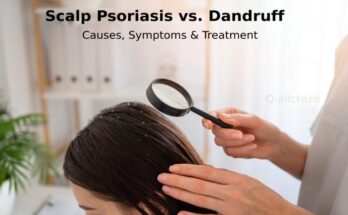Winter months bring a drop in temperature, but for many, it also means a rise in dandruff problems. The combination of cold air and indoor heating can worsen dandruff, making it more challenging to manage. Dandruff results from a combination of factors including fungal growth, dry skin, and excessive oil production, all of which tend to worsen during winter. Understanding the root causes and addressing them effectively is crucial for keeping your scalp healthy and flake-free.
In this comprehensive guide, we’ll explain the science behind winter dandruff, delve into effective treatment options, and provide preventive measures that work.
Why Does Dandruff Get Worse in Winter?
Dandruff is caused by an overgrowth of a yeast-like fungus called Malassezia, which thrives on the natural oils produced by your scalp. In winter, the following factors can exacerbate dandruff:
- Dry air: The cold outdoor air and heated indoor environments lack humidity, which can dry out your scalp, leading to flakiness.
- Frequent use of hats: Constantly wearing winter hats traps heat and moisture, creating the perfect environment for yeast growth.
- Hot showers: Although comforting in the cold, hot water can strip the scalp of its natural oils, making it dry and more prone to dandruff.
- Indoor Heating: Using heaters indoors leads to a drop in indoor humidity levels, making your scalp even drier. This can accelerate the formation of dandruff.
- Stress: Winter months can bring holiday stress, which affects overall skin health, including the scalp. Stress can trigger dandruff outbreaks or make existing symptoms worse.
What Are the Signs of Winter Dandruff?
Understanding the specific symptoms of winter dandruff is important in addressing it effectively. The common signs include:
- White or yellow flakes on the scalp or shoulders
- Itchy scalp, particularly after washing or brushing your hair
- Dry patches or red, irritated areas on the scalp
- Tightness or discomfort on the scalp
- Oily scalp in combination with flakiness (sometimes misunderstood as dry dandruff)
Opt for an Anti-Dandruff Shampoo with Active Ingredients
The foundation of dandruff treatment starts with the right shampoo. Choose an anti-dandruff shampoo that contains scientifically proven active ingredients. Here’s a breakdown of the most effective ingredients:
- Zinc Pyrithione: Known for its antifungal properties, it reduces the growth of Malassezia and alleviates irritation on the scalp.
- Ketoconazole: Another potent antifungal agent that helps in reducing fungal activity and restoring scalp health.
- Coal Tar: While not commonly used, coal tar-based shampoos can slow down the production of skin cells on the scalp, reducing dandruff.
- Salicylic Acid: This ingredient helps in shedding the dead skin cells on the scalp, preventing them from clumping together to form visible flakes.
If you notice these signs, it’s time to adjust your scalp care routine to counteract the effects of winter dryness.
Home Remedies for Dandruff During Winter
Here are some natural ways to manage dandruff that are safe, effective, and easy to implement:
1. Coconut Oil and Lemon
Coconut oil has moisturizing properties that can prevent the scalp from drying out, while lemon’s acidity helps balance the pH levels of the scalp.
- How to Use: Warm 2 tablespoons of coconut oil and mix in 1 tablespoon of lemon juice. Massage it into your scalp and leave it on for 30 minutes before washing your hair with a mild shampoo.
2. Aloe Vera Gel
Aloe vera is known for its soothing properties and can reduce scalp irritation and flaking.
- How to Use: Apply fresh aloe vera gel directly to your scalp and leave it on for 20-30 minutes. Rinse off with a mild shampoo.
3. Tea Tree Oil
Tea tree oil has antifungal properties that can help control dandruff by targeting the yeast responsible for it.
- How to Use: Add a few drops of tea tree oil to your regular shampoo, or dilute it with a carrier oil like coconut oil and apply it directly to the scalp.
4. Apple Cider Vinegar Rinse
Apple cider vinegar helps to balance the scalp’s pH levels and has antimicrobial properties that reduce dandruff-causing bacteria and fungi.
- How to Use: Mix equal parts of apple cider vinegar and water. After shampooing, use this mixture as a final rinse. Leave it on for a few minutes before rinsing it off.
5. Baking Soda
Baking soda acts as a mild exfoliant that helps remove dead skin cells and reduce excess oil on the scalp.
- How to Use: Wet your hair and scalp, then gently massage a small amount of baking soda into your scalp. Leave it on for a few minutes before rinsing thoroughly with water.
Moisturizing the Scalp: Essential in Winter
A dry scalp is more prone to dandruff, which makes moisturizing an essential part of your winter hair care routine. While shampoos treat the fungal cause, moisturizing keeps the scalp barrier strong and prevents flakiness caused by dryness.
Natural Oils That Work Wonders
- Coconut Oil: Contains medium-chain fatty acids, including lauric acid, which have antimicrobial properties. Coconut oil helps moisturize the scalp while preventing fungal infections.
- Jojoba Oil: Closely resembles the natural sebum produced by the scalp, making it a great choice for those with an oily but flaky scalp. It also has anti-inflammatory properties, which help reduce itching and redness.
- Argan Oil: Often referred to as “liquid gold,” argan oil is rich in Vitamin E and fatty acids that nourish the scalp and strengthen hair. It hydrates without leaving a greasy residue, making it ideal for those who want a lightweight solution.
How to Apply Scalp Oils
- Warm the oil slightly before applying it to your scalp.
- Section your hair to ensure the oil is applied evenly.
- Massage the oil into your scalp with your fingertips using gentle circular motions for 5-10 minutes to increase blood flow.
- Leave the oil on for at least 30 minutes or overnight for deeper hydration, then wash with a mild shampoo.
Diet’s Role in Dandruff Prevention
What you eat has a direct impact on your scalp health. A balanced diet helps maintain the health of your skin, including your scalp. Some key nutrients to focus on include:
- Omega-3 Fatty Acids: Omega-3s promote scalp hydration and regulate oil production. Sources include fatty fish like salmon, flaxseeds, chia seeds, and walnuts.
- Zinc: Zinc helps control oil production and boosts the immune system, which can reduce dandruff. Good sources include oysters, beef, and pumpkin seeds.
- Probiotics: Probiotics help balance the body’s microflora, which can prevent fungal overgrowth on the scalp. Yogurt, kefir, and fermented foods like kimchi are excellent sources.
- Biotin (Vitamin B7): Biotin strengthens hair and skin cells, reducing flakiness and dryness. Include biotin-rich foods like eggs, nuts, and leafy greens in your diet.
When to See a Doctor
If your dandruff persists despite trying these remedies, it’s advisable to consult a dermatologist. Dandruff may sometimes be a symptom of more severe skin conditions like seborrheic dermatitis or psoriasis, which require medical treatment.
Conclusion
Winter dandruff may be persistent, but it’s not invincible. With the right combination of treatments-including specialized shampoos, moisturizing scalp care, diet, and lifestyle adjustments-you can combat dandruff and keep your scalp healthy and flake-free all season long. By understanding the underlying causes and taking steps to prevent future outbreaks, you’ll be able to enjoy winter without worrying about unsightly dandruff.
FAQ’s
Q1: Why does dandruff get worse in winter?
Dandruff worsens in winter due to dry air, which leads to a dry scalp. Heated indoor environments further reduce moisture in the air, causing scalp dryness and an increased likelihood of dandruff.
Q2: Can hot showers make dandruff worse?
Yes, hot showers can strip your scalp of its natural oils, making it dry and more prone to dandruff. Lukewarm water is better for maintaining scalp health.
Q3: How often should I wash my hair to prevent dandruff in winter?
Washing your hair 2–3 times a week is recommended in winter. Overwashing can lead to dryness, while underwashing can cause oil buildup and dandruff.
Q4: Can diet help reduce dandruff?
Yes, a balanced diet rich in Omega-3 fatty acids, zinc, and B vitamins can help improve scalp health and reduce dandruff.
Q5: Are there natural remedies for winter dandruff?
Yes, natural remedies like tea tree oil, aloe vera, and lemon juice are effective in reducing dandruff symptoms. They have antifungal and moisturizing properties that help maintain scalp health.
Q6. Can I use coconut oil for dandruff in winter?
Yes, coconut oil is an excellent natural remedy for dandruff. Its moisturizing properties help prevent the scalp from drying out, especially during the winter.
Q7. Does wearing a hat cause dandruff?
Wearing a hat can trap sweat and heat, creating an environment for dandruff-causing fungi to thrive. Make sure to clean your hats regularly and allow your scalp to breathe when indoors.
Q8. Is apple cider vinegar safe for my scalp?
Yes, when diluted with water, apple cider vinegar is safe and effective for balancing scalp pH and reducing dandruff.
Q9. Can stress cause dandruff?
Yes, stress can weaken your immune system, making your scalp more prone to dandruff. Managing stress through relaxation techniques can help reduce dandruff flare-ups.
Note: This is for informational purposes only. For medical advice or diagnosis, consult a professional.




